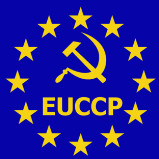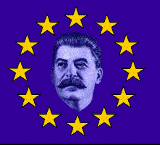A Blueprint for the Suppression of Dissent in Europe
by Baron Bodissey
 The disappearance of liberty in Europe will not be accompanied by the loud knock of a jackbooted thug at the front door.
The disappearance of liberty in Europe will not be accompanied by the loud knock of a jackbooted thug at the front door.Basic freedoms are already being eroded imperceptibly by the European Union. The process has been going on for many years, drip by silent drip. In order to create Eurabia, the will of the people is muffled, suppressed, and discarded by the elites of the EU.
We have reported several times on the Framework Decision, a document generated by the EU bureaucracy which outlines the steps to be taken to suppress “xenophobia and racism”. Among the punishments sought against offenders would be imprisonment, fines, and “temporary or permanent disqualification from the practice of commercial activities, a judicial winding-up order, exclusion from entitlement to public aid”.
In other words — given the extent to which the average European citizen depends on the resources of the State — the offender against the Multicultural Order would become a non-person, without the ability to make a living or to provide food and shelter for his family.
Calling this monstrosity “the EUSSR” is not an overstatement.
The latest bureaucratic initiative on this issue emerged from Strasbourg a few days ago. Entitled the “European Parliament resolution of 13 December 2007 on combating the rise of extremism in Europe”, it lays out a series of steps designed to enforce acceptable Multicultural groupthink across all the “provinces” of the EU.
The full text is worth reading, so I’ve included the entire document at the bottom of this post. I’ll just touch on the highlights here.
The European Parliament has taken on the task of combating “racism, intolerance, incitement to religious hatred, exclusion, [and] xenophobia”. It asserts that “these extremist ideologies are incompatible with the principles of liberty [and] democracy”. It declares that its mission includes “combating the spread of xenophobic attitudes and extremist political movements”.
It states that “neo-Nazi, paramilitary and other extremisms are directing their violent attacks against a wide variety of vulnerable population groups, including migrants, the Roma, homosexuals, anti-racist activists”.
The EU Parliament actually mentions Islamic fundamentalism, giving a passing nod to the real danger now facing Europe. But we know from experience that its targets will inevitably be the patriots and supporters of traditional European culture. To the EU, controlling Islamic fundamentalism means restraining European natives to keep them from “provoking” Islam.
Most ominously, the document proposes “withdrawing public funding from political parties that do not condemn violence and terrorism and do not respect human rights and fundamental freedoms, democracy and the rule of law”. Since most European parties cannot legally function without state funding, this effectively allows an unaccountable supranational entity to dictate which political parties are allowed to exist within what used to be the sovereign nations of Europe.
The document calls on the European Commission and the European Council to effect “appropriate political and legal responses, especially at the preventive stage with reference to young people’s education and public information”. In other words, indoctrination and thought control in the public schools are to be the order of the day.
It wants “the EU institutions to give a clear mandate to the Fundamental Rights Agency to investigate the structures of extremist groups in order to assess whether some of them coordinate their work within their groups across the European Union or at regional level”.
THIS MEANS US.
 There is no doubt that CVF-Europa and similar networks of anti-jihad activists would fall under the shadow of this rubric.
There is no doubt that CVF-Europa and similar networks of anti-jihad activists would fall under the shadow of this rubric.Ladies and gentlemen of Europe, this is a shot across our bows.
There may soon come a time when all the European readers of Gates of Vienna will be proscribed. Once all the countries of the EU ratify the Lisbon Treaty — and only a few remain — your leaders will have effectively given you over to the velvet jackboot of the bureaucrats in Brussels and Strasbourg.
- - - - - - - - -
This blog — run as it is by Americans and hosted outside of Europe, and thus beyond the reach of the long arm of the fascists of the European Union — may well become “Internet Free Europe”. Readers and former bloggers behind the new Iron Curtain will have to send encrypted emails for me to post so that the truth of what happens in Europe can be told.
The real news in Europe will no longer be available except as samizdat.
It’s come to this.
And the United States may not be far behind. Starting in 2009, under
But not yet. We still have a little time left.
European Parliament resolution of 13 December 2007 on combating the rise of extremism in Europe
(emphasis added by Gates of Vienna)
The European Parliament,
- having regard to its previous resolutions on racism, xenophobia and extremism, particularly that of 20 February 1997 on racism, xenophobia and the extreme right(1) , that of 15 June 2006 on the increase in racist and homophobic violence in Europe(2) and its position of 29 November 2007 on the proposal for a Council Framework Decision on combating certain forms and expressions of racism and xenophobia by means of criminal law(3),
- having regard to its resolution of 27 January 2005 on the Holocaust, anti-Semitism and racism(4),
- having regard to Articles 6, 7 and 29 of the EU Treaty and Article 13 of the EC Treaty, which commit the EU and its Member States to upholding human rights and fundamental freedoms and which provide it with the means to fight racism, xenophobia and discrimination, to the Charter of Fundamental Rights of the European Union (the Charter of Fundamental Rights) and to the Council Regulation (EC) No 168/2007 of 15 February 2007 establishing the European Union Fundamental Rights Agency(5) (the Fundamental Rights Agency),
- having regard to the international human rights instruments which prohibit discrimination based on racial and ethnic origin, notably the International Convention on the Elimination of All Forms of Racial Discrimination and the European Convention for the Protection of Human Rights and Fundamental Freedoms (ECHR), both signed by all the Member States and a large number of other States,
- having regard to European Union activities to fight racism, xenophobia, anti-Semitism and homophobia, in particular the two anti-discrimination directives (Directive 2000/43/EC implementing the principle of equal treatment of persons irrespective of racial or ethnic origin(6) and Directive 2000/78/EC establishing a general framework for equal treatment in employment and occupation(7) ), as well as to the above-mentioned Framework Decision on combating racism and xenophobia,
- having regard to Resolution 1344 of 29 September 2003 of the Parliamentary Assembly of the Council of Europe on the threat posed to democracy by extremist parties and movements in Europe,
- having regard to the Report on Racism and Xenophobia in the Member States of the EU published in 2007 by the Fundamental Rights Agency,
- having regard to the report by the Organization for Security and Co-operation in Europe (OSCE) entitled ‘Challenges and Responses to Hate-Motivated Incidents in the OSCE Region’ of October 2006,
- having regard to Rule 103(4) of its Rules of Procedure,
| A. | seriously concerned at the resurgence in Europe of extremist movements and paramilitary groups and parties, some of which even have governmental responsibilities, which base their ideology, political discourse, practices and conduct on discrimination, including racism, intolerance, incitement to religious hatred, exclusion, xenophobia, anti-Semitism, anti-Gypsyism, homophobia, misogyny and ultra-nationalism, and whereas several European countries have recently experienced hatred, violent events and killings, | |
| B. | seriously alarmed at the Islamic fundamentalist recruitment and violent propaganda campaign with terrorist attacks within the European Union, based on the hatred of European values and anti-semitism, | |
| C. | whereas these extremist ideologies are incompatible with the principles of liberty, democracy, respect for human rights and fundamental freedoms and the rule of law as set out in Article 6 of the EU Treaty, which reflect the values of diversity and equality on which the European Union is based, | |
| D. | whereas no Member State is immune from the intrinsic threats that extremism poses to democracy and, therefore combating the spread of xenophobic attitudes and extremist political movements is a European challenge that requires a joint and coordinated approach, | |
| E. | whereas some political parties and movements, including those currently in power in a number of countries or represented at local, national or European level, have deliberately placed intolerance and/or violence based on race, ethnic origin, nationality, religion and sexual orientation at the heart of their agenda, | |
| F. | whereas neo-Nazi, paramilitary and other extremisms are directing their violent attacks against a wide variety of vulnerable population groups, including migrants, the Roma, homosexuals, anti-racist activists and the homeless, | |
| G. | whereas the existence of public and easily accessible websites which incite to hatred raises serious concerns as to how to counteract the problem without violating freedom of expression, |
| 1. | Strongly condemns all racist and hate attacks, and calls on all authorities to do everything in their power to punish those responsible; expresses its solidarity with all victims of such attacks and their families; | |
| 2. | Points out that fighting extremism must not have any negative effects on the permanent obligation to respect fundamental rights and fundamental legal principles, including freedom of expression and association, as enshrined in Article 6 of the EU Treaty; | |
| 3. | Deplores the fact that some mainstream parties have seen fit to give credibility and acceptance to extremist parties by entering into coalition agreements, thereby sacrificing their moral integrity for the sake of short-term political gain and expediency; | |
| 4. | Notes that the increasing number of extremist organisations, which often contain neo-fascist elements, can exacerbate fears in society that can lead to manifestations of racism in a broad range of areas, including employment, housing, education, health, policing, access to goods and services and the media; | |
| 5. | Urges the Commission and Council to lead the search for appropriate political and legal responses, especially at the preventive stage with reference to young people’s education and public information, teaching against totalitarianism and disseminating the principles of human rights and fundamental freedoms in order to keep alive the memory of European history; calls upon the Member States to develop policies of education for democratic citizenship based on citizens’ rights and responsibilities; | |
| 6. | Urges the Commission to monitor the full application of the existing legislation designed to prohibit incitement to political and religious violence, racism and xenophobia; calls on Member States to monitor the strict implementation and constant improvement of anti-racist laws, information and awareness-raising campaigns in the media and educational establishments; | |
| 7. | Urges all democratic political forces, regardless of ideology, to avoid any support for extremist parties of a racist or xenophobic character, whether explicit or implicit, and hence also any alliance whatsoever with their elected representatives; | |
| 8. | Warns, looking ahead to the 2009 European elections, of the possibility that extremist parties may secure representation in the European Parliament and calls on the political groups to take the appropriate measures in order to ensure that a democratic institution is not used as a platform for financing and echoing anti-democratic messages; | |
| 9. | Calls on the EU institutions to give a clear mandate to the Fundamental Rights Agency to investigate the structures of extremist groups in order to assess whether some of them coordinate their work within their groups across the European Union or at regional level; | |
| 10. | Reiterates its belief that public personalities should refrain from statements that encourage or incite to hatred or stigmatisation of groups of people on the basis of their race, ethnic origin, religion, disability, sexual orientation or nationality; believes that if public personalities incite to hatred, the fact that they have a high public profile should be considered an aggravating circumstance; condemns, in particular, the worrying prevalence of anti-semitism; | |
| 11. | Calls on the media to inform the public about the dangers of hate speech and to help promote the principles and values of democracy, equality and tolerance; | |
| 12. | Requests all Member States to at least provide for the possibility — after a court ruling — of withdrawing public funding from political parties that do not condemn violence and terrorism and do not respect human rights and fundamental freedoms, democracy and the rule of law as set out in the ECHR and the Charter of Fundamental Rights; and calls on those that already have this possibility to do so without delay; also calls on the Commission to ensure that no EU funding is available to media which are used as a platform to widely promote racist, xenophobic and homophobic ideas; | |
| 13. | Calls on the Commission to support NGOs and civil society organisations devoted to promoting democratic values, human dignity, solidarity, social inclusion, inter-cultural dialogue and social awareness of the dangers of radicalisation and violent extremism, and which are devoted to fighting all forms of discrimination; | |
| 14. | Instructs its President to forward this resolution to the Council, the Commission, the governments of the Member States and the Council of Europe. |

| 1. | OJ C 85, 17.3.1997, p. 150. | |
| 2. | OJ C 300 E, 9.12.2006, p. 491. | |
| 3. | Texts adopted, P6_TA(2007)0552. | |
| 4. | OJ C 253 E, 13.10.2005, p. 37. | |
| 5. | OJ L 53, 22.2.2007, p. 1. | |
| 6. | OJ L 180, 19.7.2000, p. 22. | |
| 7. | OJ L 303, 2.12.2000, p. 16. |
You cannot now say that you have not been warned !!!





















1 comment:
So that is why they want to introduce state funding of parties. Look what happened to the Vlams Blok/Belang
Post a Comment